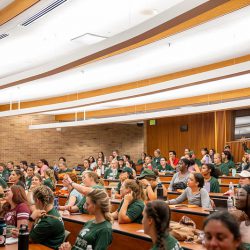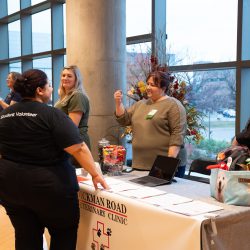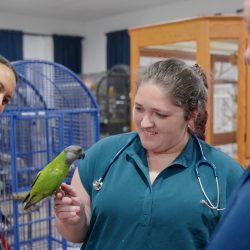The Multicultural Scholars Program, a fellowship at the Michigan State University College of Veterinary Medicine, sponsors five veterinary students who come from populations that are underrepresented in the veterinary medical field, and aims to create a more diverse workforce in food animal medicine.

Today, the global food production system is more complex than it ever has been. Proof is right in the name: “global.” Not long ago, it would have been uncommon to eat breakfast that was, in part, produced on another continent.
Luckily, more well-trained veterinary professionals—specifically, those from underrepresented populations—can better maintain and develop this complex system. As different cultural communities consume different foods in different ways, these habits generate important discussions regarding food safety, food animal ethics, and other critical topics. Diverse veterinary professionals can support food producers by bringing these perspectives to the table.
For this to occur, underrepresented populations need stronger access to the veterinary field. Enter the Multicultural Scholars Program, a fellowship at the Michigan State University College of Veterinary Medicine.
Meet the 2022 Scholars

- Kate Edmunds, DVM Class of 2022, is a winner of the American Association of Swine Veterinarian’s Student Poster Competition scholarship.
- Valeria Johnson, DVM Class of 2022, is a member of the Pathology Club’s executive board. More about Valeria.
- Orlando Ochoa, DVM Class of 2023, has served on the Food Animal Club’s executive board, and led a summer research project with Merck Animal Health. Read more from Orlando.
About the Program
The Program, funded by the Higher Education Multicultural Scholars Program at USDA's National Institute of Food and Agriculture, sponsors a total of five doctor of veterinary medicine (DVM) students, each of whom belongs to cultural communities that are underrepresented in veterinary medicine. Each scholar is interested in food animal medicine, and the Program helps them pursue a related career path, which ultimately will contribute to a more diverse workforce.
“I’m so very thankful to be involved in the fellowship,” says Valeria Johnson, DVM Class of 2022, one of the scholars. “Even though much of our vet school experience has been virtual, we were still able to connect with industry experts nearly weekly. There was no shortage of enthusiastic industry and academic experts willing to share their knowledge.”
The scholars meet weekly with their advisor, Assistant Professor Dr. Jane Manfredi of the College’s Department of Pathobiology and Diagnostic Investigation, for hands-on or virtual activities (a recent meeting featured beekeeping and bee medicine with Professor Emeritus Dr. Kent Ames). The group meets for everything from lectures and wet labs to mentor-mentee barbeques, academic and ethical discussions, resume workshops, and national conferences.
“The Program helps us not only with financial stress, but also to explore different industries within food animal medicine,” says Orlando Ochoa, DVM Class of 2022, another scholar. “We’re able to get advice from a variety of different veterinarians and learn about their stories, which inspires me.”
The scholars also take monthly Spanish lessons and practice their conversational skills often. In addition, each scholar gives back to youth in the communities through outreach programs, helping them explore career opportunities and answer questions about veterinary work.
“Scholars have been immersed in various leadership, diversity, service, mentorship, professional skills, and research activities over the past few years, as well as part of the focus of the grant,” says Manfredi. “They are an awesome group and I’m so fortunate to be able to work with them.”
Manfredi and Dr. Hilda Mejia-Abreu, associate dean of Admissions, Student Life, and Inclusivity at the College, are co-principal investigators on the grant that funds the Multicultural Scholars Program. Their goals is to sponsor more veterinary students in the future.
“The Multicultural Scholars Program connects students with food animal veterinarians both in academia and out in industry,” says Johnson. “The Program has been a true asset to my education by providing this mentorship.”



